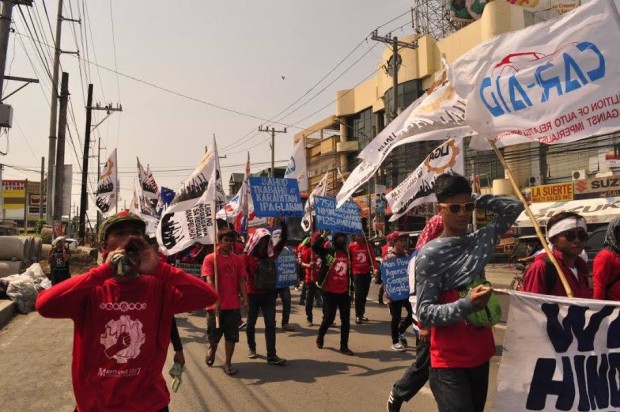
Crowds of workers spilled onto the streets all over the country, on Labor Day, May 1, 2017, to press for higher wages and job security. In this May 1 photo, workers affiliated with the Pamantik-Kilusang Mayo Uno group join the march on Labor Day, in Calamba City, Laguna, which is just as urbanized as Cagayan de Oro City. (Photo courtesy of Pamantik-KMU)
CAGAYAN DE ORO CITY – Low wages and job insecurity have remained the concerns of the millions of workers throughout the country as labor groups and other militant sector staged protest actions during the Labor Day observance on Monday.
In the Northern Mindanao region as elsewhere, the workers are suffering because of government neglect and the implementation of anti-workers policies while promoting the interests of the capitalists over the wage earners, according to Wildon Barros, secretary-general of the labor group Kilusang Mayo Uno (KMU) in Northern Mindanao.
Workers in the region have been bearing low salaries and the uncertainty of short-term contractual work amid the skyrocketing inflation.
The Philippine Statistics Authority (PSA) says Northern Mindanao has about 1.394 million workers, 40 percent of whom are employed in the agriculture sector.
For instance, most of the employees in the cities of Cagayan de Oro and Iligan, Barros said, have been receiving the current daily wage of P318 per day. The KMU-NMR insists this is not sufficient to provide for a family of five persons.
“That (P318) is not enough considering that a study showed that a family of five here needs at least P1,119 daily to live comfortably,” Barros said.
Nicandro Borja, regional vice president of the Associated Labor Union-Trade Union Congress of the Philippines (ALU-TUCP), said they have been pushing for a P168 across-the-board daily wage increase.
The KMU is pushing for the P750 national minimum daily wage.
“With the increase in prices of basic commodities, fare, education and other expenses, the P318 minimum wage (in Northern Mindanao) is not enough for a family’s daily needs,” Borja said.
Borja said that if the proposed increase was approved, the minimum daily wage would be P486, which would still be within the poverty line.
He said the expenses in Manila and other major cities in the country have been the same as those in Cagayan de Oro.
“There is no difference among the expenses and employers are saying that businesses will suffer and may shut down, but in reality, they don’t because the public will have more money to spend which will mean an increase in business,” Barros said.
The KMU has lambasted the Duterte administration for not fulfilling some of its promises, especially the one on ending contractualization.
“Under the government of Duterte, contractualization is still prevalent, workers are still crucified to a cross of low wage, while poverty is spreading,” Barros said.
He said President Duterte failed in his campaign promise in liberating the work force of the country from the chains of contractual employment.
To date, some 24.4 million workers or 63 percent of the country’s workforce have remained contractual.
Barrosa said the labor department, through its Department Order 174, has perpetuated contract-based jobs, circumventing labor laws.
“Workers should unite and empower themselves to fight for just compensation and protect theiights as workers,” he added. SFM